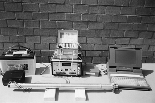
UTD, Inc. collaborates with DOE - POLO anyone?
A small business success story
 UTD, Inc. is a 20-employee company that has successfully collaborated with the U.S. Department of Energy to meet one of the department's technology needs. Initiatives interviewed John Hill, Vice President of Marketing for UTD, Inc., to learn about his company's development of a unique position location device called POLO and to hear about his experiences working with DOE to further develop and market POLO.
UTD, Inc. is a 20-employee company that has successfully collaborated with the U.S. Department of Energy to meet one of the department's technology needs. Initiatives interviewed John Hill, Vice President of Marketing for UTD, Inc., to learn about his company's development of a unique position location device called POLO and to hear about his experiences working with DOE to further develop and market POLO.
POLO (POsition LOcator) is a sensor used with penetrometers during site characterizations. Hill says the assumption that a penetrometer rod travels a path perpendicular to the ground surface after entry is almost never valid. The leading section of a penetrometer rod fitted with the POLO module measures the changing location of the penetrometer tip during its bending and turning passage through the ground. From its measurements, POLO mathematically reconstructs the penetrometer's path on a computer.
 An advantage of POLO is its size. It is small enough to be used with conventional penetrometers while still leaving room for other environmental sensors. While POLO accurately calculates the position of the penetrometer tip, other probes within the penetrometer sense chemical and gas contamination or the mechanical properties of soils. POLO and the other probes transmit their signals through cables running through the penetrometer to the surface. Data from POLO is used in concert with data from other probes to map contaminated plumes in different areas.
An advantage of POLO is its size. It is small enough to be used with conventional penetrometers while still leaving room for other environmental sensors. While POLO accurately calculates the position of the penetrometer tip, other probes within the penetrometer sense chemical and gas contamination or the mechanical properties of soils. POLO and the other probes transmit their signals through cables running through the penetrometer to the surface. Data from POLO is used in concert with data from other probes to map contaminated plumes in different areas.
Unlike other position locator devices, POLO's data is not influenced by nearby magnetic material such as steel storage tanks. Early detection at high risk sites, such as near tanks, translates into a smaller volume of soil requiring treatment, and ultimately a reduction of the cost of the remediation effort.
UTD won a contract through DOE's 1991 Program Research and Development Announcement to develop, field test, and demonstrate POLO's accuracy in assessing the coordinates of penetrometer tips during site characterizations. The company had been using its internal research and development funds and had a patent pending for POLO. During the contract's period of performance - July 1992 to September 1994 - UTD designed, manufactured, and field tested a POLO prototype. During the field test at DOE's Savannah River Complex, POLO demonstrated location accuracy to within 0.5 percent of distance traveled. This means that if the penetrometer tip is pushed 100 feet into the ground, POLO is expected to locate the tip of the penetrometer within a six-inch radius.
UTD is currently working to improve penetrometer delivery systems so they can more effectively use the benefits of POLO. A contract awarded through DOE's Research Opportunity Announcement is allowing the company to develop a penetrometer steering capability for adjusting the Penetrometer's direction. A vibratory mechanism in the penetrometer's hydraulic drive will increase the distances traveled and the maneuverability of the penetrometer. UTD will also provide the first commercial POLO unit, which will be installed on DOE's Site Characterization and Analysis Penetrometer System truck at Argonne National Lab. The SCAPS truck will be equipped with POLO and other emerging sensor penetrometer capabilities, which will be exhibited at DOE sites.
Hill believes other small businesses interested in winning DOE contracts for development of environmental technologies must invest the time to learn DOE's priority needs. "In doing this kind of research and in gaining these kinds of financial support from the government, you have to make that investment. I don't see any way around exploring what the needs are, making sure you're meeting a priority need, and then talking with those involved in the funding process. You can't afford not to do this. It is at least as valuable, if not more valuable than the time you spend on your proposal."
Hill sees the solicitation system working in the public interest. "As a taxpayer I think the system actually does work fairly well. It is designed to make sure that the kinds of things being funded meet legitimate needs, provide specific benefits to the government, and have been selected from a broad range of innovative concepts." However, he is disturbed by a trend he is seeing in more government solicitations (the requirement to cost share. "Our company of 20 people occasionally has the opportunity to do some cost sharing, but we cannot survive doing cost sharing on a long-term basis. The bottom line for small businesses is adequate cash flow. This results from operating profitably. Cost sharing at early stages of development removes profitability and uses scarce resources. It just can't be done."

 UTD, Inc. is a 20-employee company that has successfully collaborated with the U.S. Department of Energy to meet one of the department's technology needs. Initiatives interviewed John Hill, Vice President of Marketing for UTD, Inc., to learn about his company's development of a unique position location device called POLO and to hear about his experiences working with DOE to further develop and market POLO.
UTD, Inc. is a 20-employee company that has successfully collaborated with the U.S. Department of Energy to meet one of the department's technology needs. Initiatives interviewed John Hill, Vice President of Marketing for UTD, Inc., to learn about his company's development of a unique position location device called POLO and to hear about his experiences working with DOE to further develop and market POLO.

